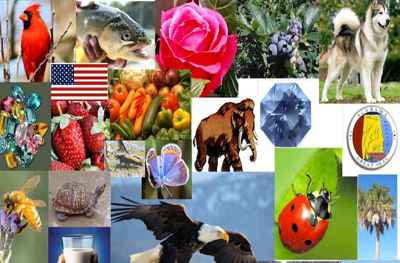
Utah Symbols
- State Resources
- » 50 States
- » Utah
- » Symbols
Utah State Emblem
Beehive

Adopted on March 4, 1959.
The beehive became the official state emblem on March 4, 1959. It was adopted by the Legislature of the State of Utah as House
Bill No. 34. Utahns relate the beehive symbol to industry and the pioneer virtues of thrift and perseverance. The beehive was chosen as the emblem
for the provisional State of Deseret in 1848 and was maintained on the seal of the State of Utah when Utah became a state in 1896.
The Beehive is omnipresent as a symbol in Utah history. It appeared as early as 1851 on the seal of the Territory of Utah. It was readopted on the
state seal by the first state legislature in 1896. The origin of the Beehive as a symbol is associated with Mormon scripture. The symbol is prominently
displayed in names and trademarks throughout the state. But not until 1959, did it become Utah's official emblem.
Utah State Emblem: Beehive

Utahns relate the beehive symbol to industry and the pioneer virtues of thrift and perseverance. The beehive was chosen as the emblem for the provisional State of Deseret in 1848 and was maintained on the seal of the State of Utah when Utah became a state in 1896.
Not unlike other leaders throughout history who have chosen symbols to inspire the best in their people, 19th-century leaders of The Church of Jesus Christ of Latter-day Saints selected a symbol to represent the kind of community they hoped to establish in the Rocky Mountains.
The beehive - now Utah's state symbol - gave expression to values that helped early Mormon pioneers survive on the American frontier: industry and cooperation.
An interpretation of this symbol appeared in an 11 October 1881 article in Salt Lake City's Deseret News, stating: "The hive and honey bees form our communal coat of arms. ... It is a significant representation of the industry, harmony, order and frugality of the people, and of the sweet results of their toil, union and intelligent cooperation."
Utah's emblem is in the form of an old-style beehive known as a skep. These dome-shaped skeps were made using twisted coils of straw. Mormon pioneers brought five of them to Utah in 1848.
- The beehive - Utah's state symbol - was chosen by early leaders of The Church of Jesus Christ of Latter-day Saints to represent the kind of community they hoped to establish in the Rocky Mountains.
- The beehive symbolizes industry and cooperation - values necessary for Mormon pioneers to survive the harsh, primitive living conditions on the American frontier.
- The origin of the beehive symbol probably was inspired by Latter-day Saint scripture that tells of an ancient people who journeyed to the New World and carried with them "deseret," which means "honey bee."
- Use of the beehive symbol and the terms deseret and beehive has continued in numerous forms: on Utah's state flag and seal, on buildings, in names of businesses and Church organizations and in Utah's nickname - the "Beehive State."
- The beehive symbol also acknowledges Latter-day Saints' strong work ethic and their desire to be connected with each other as they work together for the benefit of all members of the community.
Utah Law
The law designating the beehive. as the official Utah state emblem is found in the Utah Statutes, Title 63, Chapter 13, Section 63-13-5.5 (7).
TITLE 63. State Affairs in General.
CHAPTER 13. Miscellaneous Provisions.
SECTION 63-13-5.5. State Symbols.
63-13-5.5. State symbols.
(1) Utah's state animal is the elk.
(2) Utah's state bird is the sea gull.
(3) Utah's state centennial astronomical symbol is the Beehive Cluster located in the constellation of Cancer the Crab.
(4) Utah's state centennial star is Dubhe, one of the seven bright stars composing the Big Dipper in the constellation Ursa Major.
(5) Utah's state centennial tartan, which honors the first Scots known to have been in Utah and those Utahns of Scottish heritage, shall have a pattern
or repeating-half-sett of white-2, blue-6, red-6, blue-4, red-6, green-18, red-6, and white-4 to represent the tartan worn anciently by the Logan and
Skene clans, with the addition of a white stripe.
(6) Utah's state cooking pot is the dutch oven.
(7) Utah's state emblem is the beehive.
(8) Utah's state fish is the Bonneville cutthroat trout.
(9) Utah's state flower is the sego lily.
(10) Utah's state folk dance is the square dance, the folk dance that is called, cued, or prompted to the dancers and includes squares, rounds, clogging,
contra, line, and heritage dances.
(11) Utah's state fossil is the Allosaurus.
(12) Utah's state fruit is the cherry.
(13) Utah's state vegetable is the Spanish sweet onion.
(14) Utah's historic state vegetable is the sugar beet.
(15) Utah's state gem is topaz, as is prominently found in the Thomas Mountain Range in Juab County, Utah.
(16) Utah's state grass is Indian rice grass.
(17) Utah's state hymn is "Utah We Love Thee" by Evan Stephens.
(18) Utah's state insect is the honeybee.
(19) Utah's state mineral is copper.
(20) Utah's state motto is "Industry."
(21) Utah's state railroad museum is Ogden Union Station.
(22) Utah's state rock is coal.
(23) Utah's state song is "Utah This is the Place" by Sam and Gary Francis.
(24) Utah's state tree is the blue spruce.







